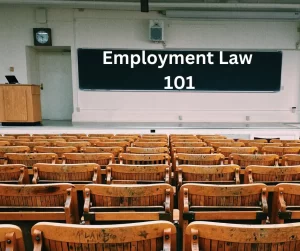
Under the Washington Law Against Discrimination, what remedies are available when pursing claims of employment discrimination? Here’s my point of view.
(IMPORTANT: This article is for informational purposes only and is based upon my point of view. Due to the rapidly changing nature of the law, we make no warranty or guarantee concerning the accuracy or reliability of the content in this article. No content on this site, regardless of date, should ever be used as a substitute for direct legal advice from your attorney. Please review our Disclaimer | Terms of Use | Privacy Policy before proceeding.)
The Washington Law Against Discrimination (WLAD)
The WLAD is a potent statute enacted in 1949, and it covers a broad array of categories, including the following:
Freedom from discrimination—Declaration of civil rights.
(1) The right to be free from discrimination because of race, creed, color, national origin, citizenship or immigration status, sex, honorably discharged veteran or military status, sexual orientation, or the presence of any sensory, mental, or physical disability or the use of a trained dog guide or service animal by a person with a disability is recognized as and declared to be a civil right. This right shall include, but not be limited to:
(a) The right to obtain and hold employment without discrimination;
(b) The right to the full enjoyment of any of the accommodations, advantages, facilities, or privileges of any place of public resort, accommodation, assemblage, or amusement;
(c) The right to engage in real estate transactions without discrimination, including discrimination against families with children;
(d) The right to engage in credit transactions without discrimination;
(e) The right to engage in insurance transactions or transactions with health maintenance organizations without discrimination: PROVIDED, That a practice which is not unlawful under RCW 48.30.300, 48.44.220, or 48.46.370 does not constitute an unfair practice for the purposes of this subparagraph;
(f) The right to engage in commerce free from any discriminatory boycotts or blacklists … ; and
(g) The right of a mother to breastfeed her child in any place of public resort, accommodation, assemblage, or amusement.
RCW 49.60.030(1) (emphasis, paragraph formatting, and hyperlinks added). The WLAD protects, inter alia, employees from the unfair practices of employers.
Unfair Practices of Employers
Under the WLAD, certain employers are prohibited from engaging in specific unfair practices in employment. The relevant law states as follows:
It is an unfair practice for any employer:
[REFUSE TO HIRE]
(1) To refuse to hire any person because of age, sex, marital status, sexual orientation, race, creed, color, national origin, citizenship or immigration status, honorably discharged veteran or military status, or the presence of any sensory, mental, or physical disability or the use of a trained dog guide or service animal by a person with a disability, unless based upon a bona fide occupational qualification: PROVIDED, That the prohibition against discrimination because of such disability shall not apply if the particular disability prevents the proper performance of the particular worker involved: PROVIDED, That this section shall not be construed to require an employer to establish employment goals or quotas based on sexual orientation.
[dISCHARGE OR BAR FROM EMPLOYMENT]
(2) To discharge or bar any person from employment because of age, sex, marital status, sexual orientation, race, creed, color, national origin, citizenship or immigration status, honorably discharged veteran or military status, or the presence of any sensory, mental, or physical disability or the use of a trained dog guide or service animal by a person with a disability.
[DISCRIMINATE IN COMPENSATION OR IN OTHER TERMS/CONDITIONS OF EMPLOYMENT]
(3) To discriminate against any person in compensation or in other terms or conditions of employment because of age, sex, marital status, sexual orientation, race, creed, color, national origin, citizenship or immigration status, honorably discharged veteran or military status, or the presence of any sensory, mental, or physical disability or the use of a trained dog guide or service animal by a person with a disability: PROVIDED, That it shall not be an unfair practice for an employer to segregate washrooms or locker facilities on the basis of sex, or to base other terms and conditions of employment on the sex of employees where the commission by regulation or ruling in a particular instance has found the employment practice to be appropriate for the practical realization of equality of opportunity between the sexes.
[STATEMENTS, ADVERTISEMENTS, PUBLICATIONS, APPLICATIONS FOR EMPLOYMENT, INQUIRIES IN CONNECTION WITH PROSPECTIVE EMPLOYMENT]
(4) To print, or circulate, or cause to be printed or circulated any statement, advertisement, or publication, or to use any form of application for employment, or to make any inquiry in connection with prospective employment, which expresses any limitation, specification, or discrimination as to age, sex, marital status, sexual orientation, race, creed, color, national origin, citizenship or immigration status, honorably discharged veteran or military status, or the presence of any sensory, mental, or physical disability or the use of a trained dog guide or service animal by a person with a disability, or any intent to make any such limitation, specification, or discrimination, unless based upon a bona fide occupational qualification: PROVIDED, Nothing contained herein shall prohibit advertising in a foreign language.
RCW 49.60.180 (emphasis and hyperlinks added). NOTE: The foregoing unfair practices are based upon specific protected classes.
Unlawful Retaliation
The WLAD also outlaws certain types of retaliation: “[i]t is an unfair practice for any employer, employment agency, labor union, or other person to discharge, expel, or otherwise discriminate against any person because he or she has opposed any practices forbidden by … [the Washington Law Against Discrimination], or because he or she has filed a charge, testified, or assisted in any proceeding under … [the Washington Law Against Discrimination].” RCW 49.60.210. Moreover, “[i]t is an unfair practice for a government agency or government manager or supervisor to retaliate against a whistleblower as defined in chapter 42.40 RCW.” RCW 49.60.210.
WLAD Remedies
The WLAD is a powerful anti-discrimination law, and the scope of available remedies is equal in magnitude. The relevant section, RCW 49.60.030(2), states as follows:
Any person deeming himself or herself injured by any act in violation of this chapter shall have a civil action in a court of competent jurisdiction to enjoin further violations, or to recover the actual damages sustained by the person, or both, together with the cost of suit including reasonable attorneys’ fees or any other appropriate remedy authorized by this chapter or the United States Civil Rights Act of 1964 as amended, or the Federal Fair Housing Amendments Act of 1988 (42 U.S.C. Sec. 3601 et seq.).
RCW 49.60.030(2). The WLAD is clearly a broad remedial statute. See Fraternal Order of Eagles, Tenino Aerie No. 564 v. Grand Aerie of Fraternal Order of Eagles, 148 Wn.2d 224, 237, 59 P.3d 655, (2002) (hyperlink added).
Remedy Examples (Nonexclusive)
Accordingly, Washington courts allow a variety of remedies to enable Plaintiffs to be made whole. Such relief may include, but is not limited to any one or more of the following:
1. Enjoin further violations (e.g., Injunctive Relief, including, but not limited to, Reinstatement)
2. Recover the actual damages (e.g., Back Pay, Front Pay, Emotional Distress, Costs, Attorney Fees, etc.)
3. Any other appropriate remedy authorized by WLAD, the US Civil Rights Act of 1964, or the Federal Fair Housing Amendments Act of 1988 (e.g., Mental Anguish, Inconvenience, Loss of Enjoyment of Life, Medical Expenses, Tax Set-Off, Expert Witness Fees, etc.)
See RCW 49.60.030(2).
Punitive Damages
However, punitive damages are not available under the WLAD. See Chuong Van Pham v. City of Seattle, Seattle City Light, 159 Wn.2d 527, 151 P.3d 976, (2007) (citing Dailey v. North Coast Life Insurance Company, 129 Wash.2d 572, 575, 919 P.2d 589 (1996)). Read more about punitive damages under the WLAD by viewing our article: Punitive Damages Are Unavailable Under WLAD (NOTE: the link will take the reader to our Williams Law Group Blog, an external website).
Read Our Related Articles
We invite you to read more of our articles related to this topic:
» Employment Law 101: Alternative Dispute Resolution
» Employment Law 101: Definition of Pleading
» Employment Law 101: Depositions
» Employment Law 101: Discovery (WA State)
» Employment Law 101: Legal Theory
» Employment Law 101: Mediation
» Employment Law 101: Statute of Limitations
» Employment Law 101: Summary Judgment (WA State)
» Employment Law 101: The Complaint
» Employment Law 101: The Defendant
» Employment Law 101: The Plaintiff
» Employment Law 101: The Summons
LEARN MORE
If you would like to learn more, then consider contacting an experienced attorney to discuss your case. This article is not offered as legal advice and will not establish an attorney-client relationship with Law Office of Gregory A. Williams or the author of this article; please refer to our Disclaimer | Terms of Use | Privacy Policy for more information.
–gw

